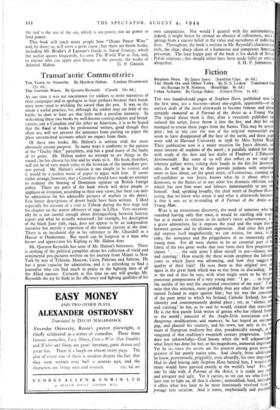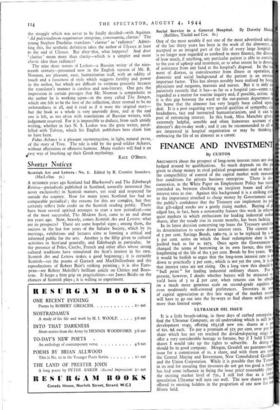Fiction
I idus Achates. By George Baker. (Cresset Press. 7s. 6d.)
THE two hundred-odd pages of Stephen Hero, published now fa the first time, are a fraction—about one-eighth, apparently—of tht earliest draft of the novel afterwards to become famous and aim certainly immortal as A Portrait of the Artist as a Young Ma The legend about them is that, after a twentieth publisher had refused the script, Joyce threw it into the fire; and that his wife managed to rescue these pages from the flames. This may be apocry. phal ; but in any case the rest of the original manuscript dos seem to have disappeared off the face of the earth, and these page were sold to Harvard University in 1938 by Miss Sylvia Beach Their publication now is a major occasion for Joyce divotes, and must interest all students of the novel ; it parallels indeed for that with study of the first and last drafts of Flaubert's L'Educatiol Sentimentale. But some of us will also reflect as we read tio whereas gallant wives, risking their hands in the fire for devotions sake, do well in so far as they provide pedants with somethia more to fuss about, yet the great artist, sef-conscious, cunning self-confident as was Joyce, knows what he is about when dismisses, to the flames or to any other less dramatic oblivion, w which has cost him years and labours immeasurable to any himself. And, speaking broadly, the chief merit of Stephen Her seeing that we know who wrote it and what it afterwards becam is that it sets us to re-reading of A Portrait of the Artist as Young Man.
Were it an anonymous discovery, the work of someone who vanished leaving only that trace, a would be startling and tragic but as it stands in relation to its author's latest achievement, it a grave admonition, for it exposes the road and the traps that between genius and its ultimate expression. And since this ge did express itself magnificently, we can rejoice, for once, in risks, the arrogance and the priggishness of an immensely gif young man. For all were shown to be an essential part of fabric of the two great works that rose from their first preposte claims. . . . the only arms I allow myself to use—silence, ex and cunning.' How exactly the three words prophesy the labon years to which Joyce was advancing, and how they suggest quality of their fruit! He uses them in this original text, again in the great book which was to rise from its discarding. at the end of that he says, with what might seem to be the posterous pompousness of a very young man: ' I go . . . to forge the smithy of my soul the uncreated conscience of my race.' I rnise that this sentence, more probably than any other that he turned Ireland in anger against him ; but his was the consc of the pure artist to which his Ireland, Catholic Ireland, has sistently and contemptuously denied place ; yet, in silence, and cunning' he has, as he said he would, created that consci He is the first purely Irish writer of genius who has related Ire to the world • innocent of the Anglo-Irish association and dangerous modifications and nuances, he has leaped an eno gap, and planted his country, and his town, not only in the heart of European tradition but also, paradoxically enough, in vanguard of that tradition's twentieth century progression. Ire does not acknowledge—God knows when she will acknowled what Joyce has done for her, or his magnificent, immortal import Yet he is—since the artists are the greatest among great men greatest of her purely native sons. And clearly, from adoles he knew, portentously, priggishly, even absurdly, his own imports Had he died leaving only Stephen Hero behind him, I wonder h many would have guessed- exactly at the world's loss? For, r side by side with A Portrait of the Artist, it is crude and and arrogant and ugly. Yet it carries, as we can see who have later text to light us, all that it claims ; unmodified, hard, imm it offers what was later to be most luminously resolved from portage into creation. And it states, emphatically and you the struggle which was never to be finally decided—with Aquinas. ' Ad pu/critudinem requiruntur integritas, consonantia, claritas.' The young Stephen Daedalus translates claritas ' as `radiance.' Admit- ting this, the aesthetic definition takes the author of Ulysses_ at least to the end of Ulysses. But after'that, what happens? And does
claritas ' mean more than clarity—which is a simpler and more classic idea than radiance?
The nine short stories of Leskov—a Russian writer of the nine- teenth century—presented now in the English version of Mr. R. Norman, are pleasant, easy, humanitarian stuff, with an oddity of touch and a looseness of style which suggests fertility and power in the author, but which are difficult to estimate precisely because the translator's manner is careless and non-literary. One gets the impression in certain passages that Mr. Norman is sympathetic to the author he is working upon—in the story called The Stinger,
which one felt to be the best of the collection, there seemed to be no awkwardness at all, and it read as if it were the original story— but the book as a whole is very unevenly done, and at the end one is left, as too often with translations of Russian writers, with judgement reserved. For it is impossible to deduce, from such untidy writing, whether in fact N. S. Leskov was the great writer, paral- lelled with Tolstoy, which his English publishers here claim him to have been.
Fidus Achates is a pleasant reconstruction, in light, natural prose, of the story of .Troy. The tale is told by the good soldier Achates, without affectation or offensive humour. Many readers will find it an easy way of brushing up their Greek mythology.
KATE O'BRIEN.



























 Previous page
Previous page